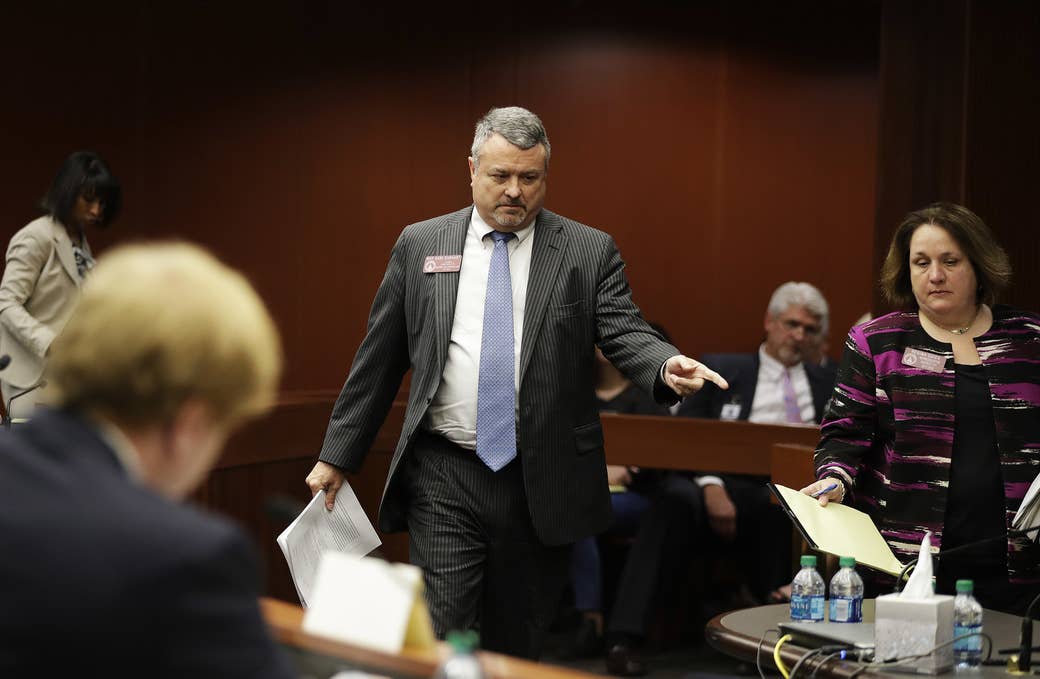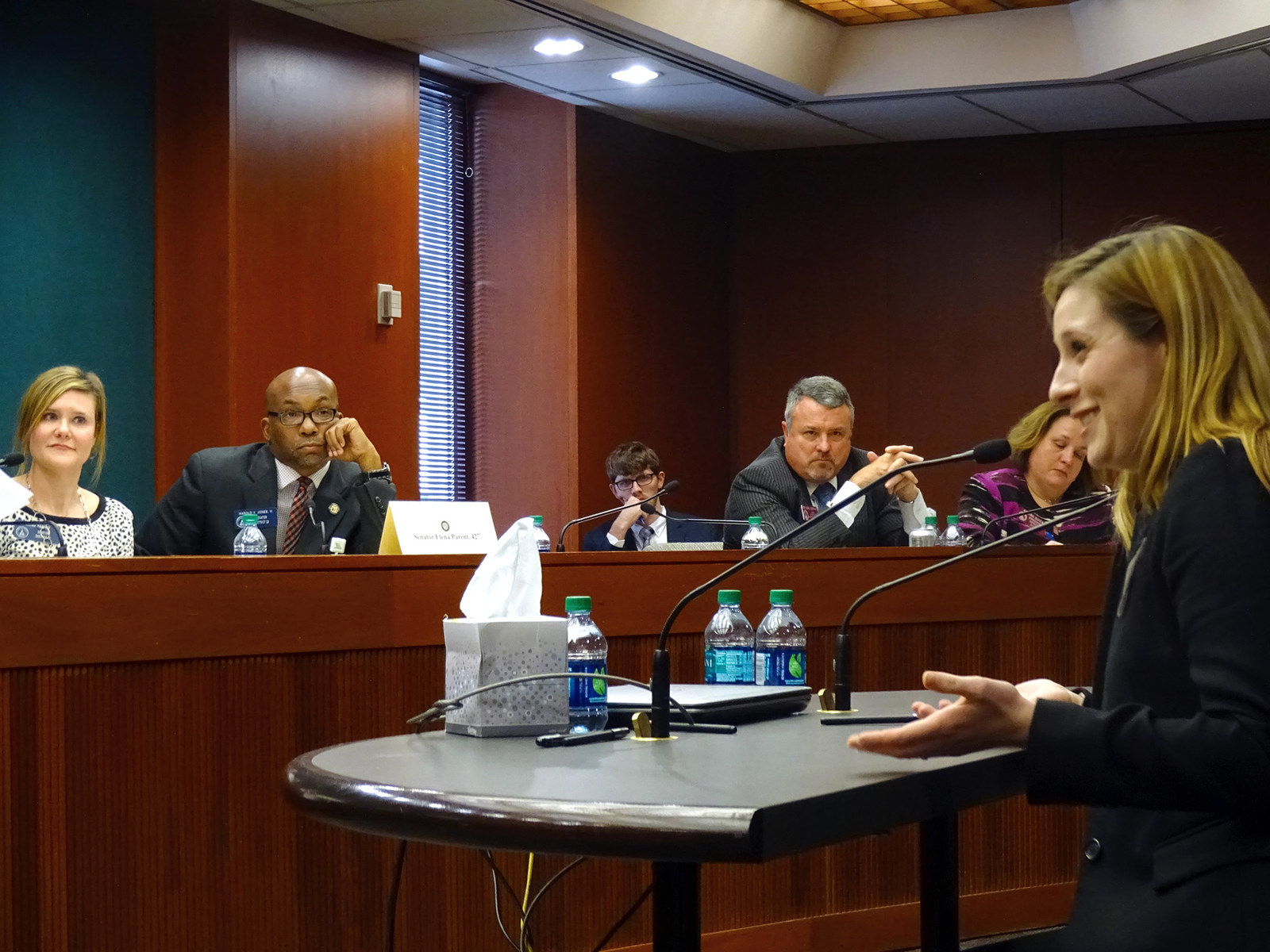
A Georgia lawmaker who says he’s trying to protect “hundreds” of men falsely accused of sexual assault made a last-minute deal to revive a controversial campus rape bill after a state senate panel killed it.
The bill tees up one of the first major battles over how colleges should handle sexual assault in the Trump era. The legislation is staunchly opposed by assault victims and local rape crisis centers and would put Georgia colleges in conflict with federal standards on how schools deal with sexual violence.
Under the proposal, HB 51, colleges must report all felony-level sexual assault offenses involving students to police — whether the victim wants cops to know or not. It also limits how schools can investigate and punish students accused of sexual assault. The bill passed the Georgia House on March 1, but after students, local attorneys, and rape victims’ advocacy groups pushed back, the state’s Senate Judiciary Committee unanimously voted on March 23 to table the bill, saying it needed more work.
But the controversial proposal came back. A bill addressing health savings accounts, SB 71, was gutted and replaced with the language of HB 51 on Tuesday night by Earl Ehrhart, a Republican representative from Powder Springs, Georgia. It passed the Georgia House 102 - 56, just before 9 p.m. Tuesday, sending it to the state senate in the final days of the legislative session. Lawmakers have until the end of the day Thursday to vote on the bill as it is, with no amendments, or kill the bill again by not acting on it.
“This is a balance between the rights of victims, the rights of accused, and due process on our campuses,” said Ehrhart, the original sponsor of HB 51, on the House floor before the vote. “I’m asking you to send it back to the senate and take another look.”
The bill that Ehrhart gutted to get his legislation through was sponsored by state Sen. Jesse Stone, the Republican chair of the committee that voted to table the campus rape bill.
Ehrhart’s legislation has no support from rape crisis centers or victims’ advocacy groups. Not even the Foundation for Individual Rights in Education, a civil liberties group that has long been critical of campus rape investigation policies, has endorsed it. FIRE often accuses schools of failing to protect the rights of accused students.
“We will not engage on every legislative effort unless we think it’s necessary to do so,” Will Creeley, one of the group’s top lawyers, told BuzzFeed News. He said several parts of the bill needed “more clarity” or duplicated existing legal requirements.
Student activists have been to the Georgia Capitol on a near-daily basis trying to defeat the bill. Eleven local and national advocacy groups signed a letter earlier this month opposing the measure. They plan to continue pushing senators to vote against the legislation before the session ends.
“This is one of the most brazen moves I've ever seen in my 26 years of working on campus safety legislation,” said S. Daniel Carter, board secretary for the national nonprofit law firm SurvJustice.
The bill takes direct aim at federal regulations under Title IX that govern how schools deal with sexual violence.
Ehrhart has said he sponsored it anticipating the Trump administration would roll back previous federal directives issued on campus rape. Ehrhart’s legislation is needed, he insists, to protect “hundreds” of men who he says are falsely accused and being punished by their universities — though there is no data to confirm this. In the state Senate Judiciary Committee hearing, Ehrhart claimed that currently, Georgia college students can “withdraw consent weeks or months later,” after sex, which isn’t true.
If this legislation became law, it would allow Georgia colleges to stop following guidelines issued in a 2011 directive that mandated schools investigate sexual assault cases. Among other things, it would require school officials to report “promptly” to law enforcement authorities if they believed a student had committed a felony sexual crime — something critics of the bill say could scare victims from coming forward. Additionally, since many forms of sexual assault under state law are classified as misdemeanors — and rape only counts in Georgia if it’s a man attacking a woman — it’s unclear how schools would decide what should be reported to police.

It also could curtail the ability of schools to conduct disciplinary hearings if a case was simultaneously being investigated by police. “I think that’s the most dangerous line in the bill,” said Grace Starling, a law student and sexual assault survivor who has led opposition to the bill. Starling believes this would enable accused students to block schools from disciplining them by arguing that evidence presented in a campus hearing could prejudice a criminal case.
Starling also said having schools report alleged assaults to police doesn’t guarantee justice. After she was raped as an undergraduate, Starling said, her case languished for 2 ½ years before police dropped it without prosecuting anyone, or even telling her it was closed — Starling only found that out after a reporter contacted her.
She isn’t sure she’d go to police knowing now what she knew then. “If I knew it was going to be this way, I don’t know if I would’ve ever reported it. And that’s really common, that people regret reporting it,” Starling said.
Some advocates also note that communities of color and LGBTQ individuals might not trust police to deal with their assaults.
“How am I, as a black woman, supposed to trust law enforcement and trust the justice system which has failed black people for many years?” said Venkayla Haynes, a senior at Spelman College in Atlanta.
State Rep. Regina Quick, a GOP co-sponsor of the bill, met with advocates at the Cottage, an Athens-based rape crisis center, after the legislation was proposed. Quick appeared to not understand why a victim would be reluctant to report a sexual assault to police, according to Sally Sheppard, executive director of the Cottage.
Sheppard told BuzzFeed News that she is concerned that Quick “does not get why it’s not OK to take away someone’s right as to who now knows who has touched her body without her consent.”
Ehrhart and Quick did not respond to multiple requests for interviews Wednesday.
For the past two years, Ehrhart has hounded public universities in the state over cases that he believes treated accused students unfairly, holding multiple hearings on the issue. Last year, he said that Georgia Tech’s president should resign over a lack of due process on the campus. Ehrhart, chairman of the appropriations subcommittee on higher education, threatened to cut funding to schools if they didn’t improve to his liking.
Ehrhart is currently suing the U.S. Education Department, arguing that its 2011 directive was unlawful. If Ehrhart’s lawsuit is successful, it could mean that no university in the country would be expected to follow the Obama-era directive.
